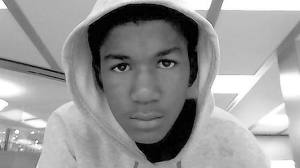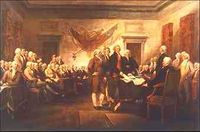Think of this as Volume 16, Number 14 of A-Clue.com, the online newsletter I've written since 1997. Enjoy.

The instrument for this is fear. Fearing others dehumanizes the one who is feared, and sets up the one who fears to be dehumanized in turn.
I got a little taste of that last weekend.
It's become a trope, the young, attractive woman who suddenly drops an “n-bomb” on friends of the guy who has been chasing her, causing him to back away. It's a new trope because, until very recently, the bomb would be dropped in private and wouldn't bother our hero at all.
In this case, I was discussing current events with an otherwise sane and attractive woman in the Atlanta suburbs when the Trayvon Martin case came up. My view is that it's manslaughter, what Jerry Seinfeld once called “I can't believe it's not murder.” A law dubbed “stand your ground” is giving ordinary citizens a license to kill, leading them to believe that in protecting their neighborhoods with deadly force they will be presumed to be acting in the name of the law.
That's not what the law's advocates say it's for, but the confusion means murder charges against citizens claiming the victim is dangerous will be hard to make stick until the law changes.
This tragedy almost befell my own neighborhood of Kirkwood in Atlanta, a year ago. Some kids were harassing a convenience store clerk, and the new neighborhood watch leader apparently came upon the scene, waving his gun around to frighten them off. The gun was not fired, but the watch captain resigned. Kirkwood came that close to being Sanford, Florida.
Had that happened one of my neighbors, a kid who looked much like Trayvon Martin, might be dead. I thought the President was very statesmanlike when he pointed out, in the name of comforting Martin's family, that “If I had a son he would look like Trayvon.” This was a kid, shot in the street, and the lack of an investigation should trouble everyone.
But not the woman I was talking to. “That was very divisive,” she said. This got my back up, and her husband stuck up for her. “If a kid like that, in a hoodie, came walking around here, you'd want to know what he was doing.”

Even in my neighborhood of Kirkwood, the line's seldom crossed. The man waving his gun in the early example? White. The kids he was waving it at? Black. If you don't see black kids every day, if you don't know their parents and understand their culture, then a group of them heading toward you can look menacing. Only after you know them might you know that the school bus just came, or football practice just ended, or they're just playing around. White kids do the same things, but even if the white kids are wearing hoodies and playing rap white parents aren't scared.

We let the walls enslave us. The woman who fears Trayvon Martin may accept, in turn, her Mexican husband's demands that she buy the teachings of the Roman Catholic Church, and deny other women the right to make their own health care choices. A young black man's parents, at the same time, may listen to the teachings of their church and damn gay men in their midst, while the preacher goes around having sex with them “on the down low.”
In this way all these groups – blacks, gays, women, Mexicans – are played off one another and dehumanized in their turn. It's their fear of one another that keeps them enslaved.

Great, I said to my white neighbors. You just got a little taste of what your neighbors have had to deal with every day of their lives. Sucks, don't it?
Yes, it sucks. But until we tear down the walls, until we accept that, yes, Trayvon Martin could be our son, that said son might even be gay, then the fears of women for their families' well being will keep them, and us, enslaved.
Rick Santorum is wrong when he says that government can't give you rights, that rights come only from God. Rights may come from God, they may or may not be protected by government.
What is true is they are not given. They are taken.

But once you've got yours, it's so easy to just build a wall and forget the lesson, to dehumanize the “other,” and in so doing to enslave yourself.











Well in this fast world enslaving our self is tough job but if we want to do it then no one can stop us.
Well in this fast world enslaving our self is tough job but if we want to do it then no one can stop us.